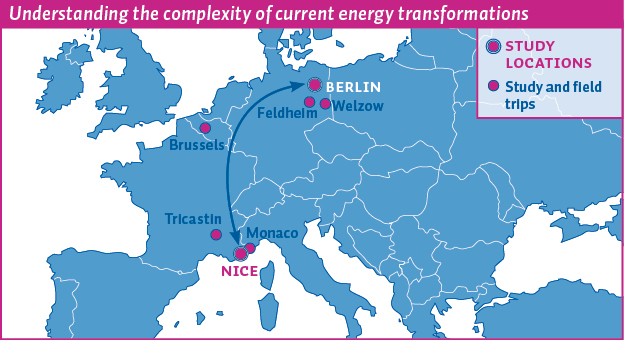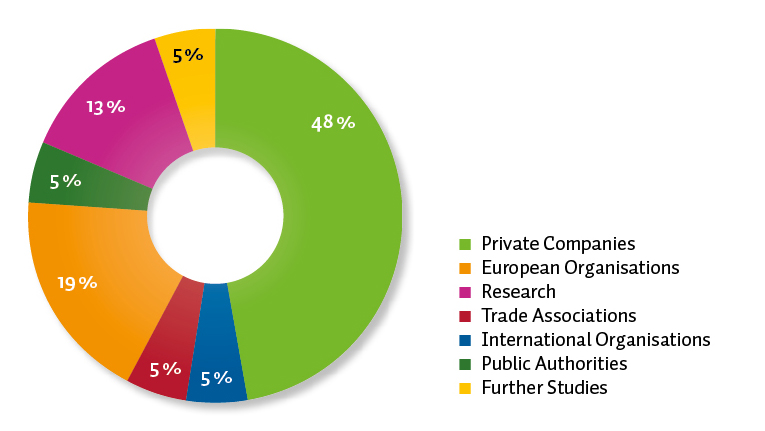|
The Master in Global Energy Transition and Governance
 Duration: 1 year (October to June) Duration: 1 year (October to June)
 Study Locations: Nice (Term 1), Berlin (Term 2), Nice (Term 3) + Study Trip to Brussels Study Locations: Nice (Term 1), Berlin (Term 2), Nice (Term 3) + Study Trip to Brussels
 Language: English Language: English
 Credits: 60 ECTS (or 90 ECTS with internship option) Credits: 60 ECTS (or 90 ECTS with internship option)
 Internship Option: 3 to 6 months to be completed by 31 December Internship Option: 3 to 6 months to be completed by 31 December
 Application Deadline: 30 June 2026 Application Deadline: 30 June 2026
 Tuition Fees: €9,800 Tuition Fees: €9,800
 Early Bird (€8,900): 31 January 2026 Early Bird (€8,900): 31 January 2026
Why Choose CIFE?
 Learn from academics and practitioners, including high-ranking national and EU institutional representatives. Learn from academics and practitioners, including high-ranking national and EU institutional representatives.
 Gain insights from peers representing over 30 countries. Gain insights from peers representing over 30 countries.
 Join a worldwide network of over 5,000 CIFE Alumni. Join a worldwide network of over 5,000 CIFE Alumni.
 We're one of the seven "designated institutions" supported by the European Union. We're one of the seven "designated institutions" supported by the European Union.
 95% of our graduates attest full satisfaction with the programme. 95% of our graduates attest full satisfaction with the programme.

Understanding the Complexity of Current Energy Transformations in Europe and Worldwide
Our Master in Global Energy Transition and Governance welcomes students from all five continents. With its unique, multidisciplinary approach, the programme analyses the links between the different levels of energy governance, from an international to a local level, offering problem-focused learning at the crossroads of theory and practice.
Graduates receive two certifications: the Master in Global Energy Transition and Governance; and the degree qualification "Policy Officer in European and International Organisations" (level 7 EQF), recognised by the French state.
Programme Structure
Our curriculum is regularly updated to reflect the current landscape of global energy policies and governance.
Please note that the information given below may be subject to change.
Professional and Research Modules
 Energy Project Cycle Management: Creating an Impact-Driven Project Energy Project Cycle Management: Creating an Impact-Driven Project
 Negotiation Techniques Negotiation Techniques
 Individual Research and Master Thesis Individual Research and Master Thesis
Read more about the teaching modules here.
|
|
Field Trips
Students take part in various field trips throughout the programme both in France and Germany to visit installations and meet energy actors. The field trips and talks with experts transform theoretical knowledge into practical understanding of the current challenges and opportunities of the energy transition. They represent a unique window into the complex world of current energy system transformations and the realities of their implementation.
Among recent visits:
 A 100% energy self-sufficient village and a mining region in Germany A 100% energy self-sufficient village and a mining region in Germany
 A nuclear power plant in France A nuclear power plant in France
 E-World: Europe's leading energy trade fair E-World: Europe's leading energy trade fair
Who Studies the Energy Master?

Where Our Graduates Work

What Our Alumni Are Saying
|
Admission Requirements
We seek motivated candidates who wish to deepen their understanding of the EU.
As an international and interdisciplinary programme, this Master is open to candidates of all nationalities and academic backgrounds.
 Bachelor's degree Bachelor's degree
 An active proficiency in English. Level should be obtained by the start of the academic year. An active proficiency in English. Level should be obtained by the start of the academic year.
 Application Deadline: 30 June 2026 Application Deadline: 30 June 2026
Click for more information on how to apply
Fees and Funding
We strive to make our programme accessible to exceptional candidates through various financial options.
 Tuition Fees: €9,800 Tuition Fees: €9,800
 Early Bird Discount: €8,900 for applications received before 31 January 2026 Early Bird Discount: €8,900 for applications received before 31 January 2026
 Scholarships: Available based on merit and need Scholarships: Available based on merit and need
 Tuition covers academic teaching, accommodation in Berlin, programme-related travel expenses, the study trip to Brussels and various field trips. Tuition covers academic teaching, accommodation in Berlin, programme-related travel expenses, the study trip to Brussels and various field trips.
Click for more information about fees and funding
|
|
About CIFE
CIFE European Institute has been at the forefront of European education since 1954. We are committed to fostering European integration and cooperation.
Under the presidency of Herman Van Rompuy, former President of the European Council, we continue to innovate in EU studies. Our offices in Nice, Berlin, Brussels and Istanbul ensure an international perspective, preparing you for the complex world of EU affairs.
|
Join the next generation of energy policy-makers!
|
|
|